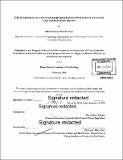The incremental value of smart buildings upon effective rents and transaction prices
Author(s)
Bando Hano, Alfredo Keitaro
DownloadFull printable version (7.420Mb)
Other Contributors
Massachusetts Institute of Technology. Center for Real Estate. Program in Real Estate Development.
Advisor
Andrea Chegut.
Terms of use
Metadata
Show full item recordAbstract
Smart buildings have grown from an increase in digital technologies that can sense, recognize and verify the experiences of the building and its inhabitants. Nascent literature has identified what it means to be considered smart. Buildings must respond to all three components of systems, performance, and service and has to have the following components: a) Smartness and technology awareness, b) economic and cost efficiency, c) personal and social sensitivity and d) environmental responsiveness. Yet, it is unclear whether these systems have any value to the users or its owners. This thesis studies the economic impact of Smart, Connected and Green buildings upon rents and transaction prices. Using numerous data sources, we identify buildings that offer at least one so-called "smart" amenity and link them with the building's achieved rent and transactions prices as well as to other so-called "innovation" amenities, like greenness and or fiber-lit connectivity. Results documented in this study suggest that buildings that offer a more integral solution (i.e. buildings that are Smart, Connected and Green) have a premium in both rents and transaction prices over similar office products. While products that offer a more disintegrated solution have a smaller premium or even no incremental value premium, with the exception of green only buildings that offers a premium by themselves. This study contributes to the vast literature on real estate innovation but explores particularly the recent commercial office products that are Smart Buildings.
Description
Thesis: S.M. in Real Estate Development, Massachusetts Institute of Technology, Program in Real Estate Development in conjunction with the Center for Real Estate, 2018. Cataloged from PDF version of thesis. Includes bibliographical references (pages 58-61).
Date issued
2018Department
Massachusetts Institute of Technology. Center for Real Estate. Program in Real Estate Development.; Massachusetts Institute of Technology. Center for Real EstatePublisher
Massachusetts Institute of Technology
Keywords
Center for Real Estate. Program in Real Estate Development.